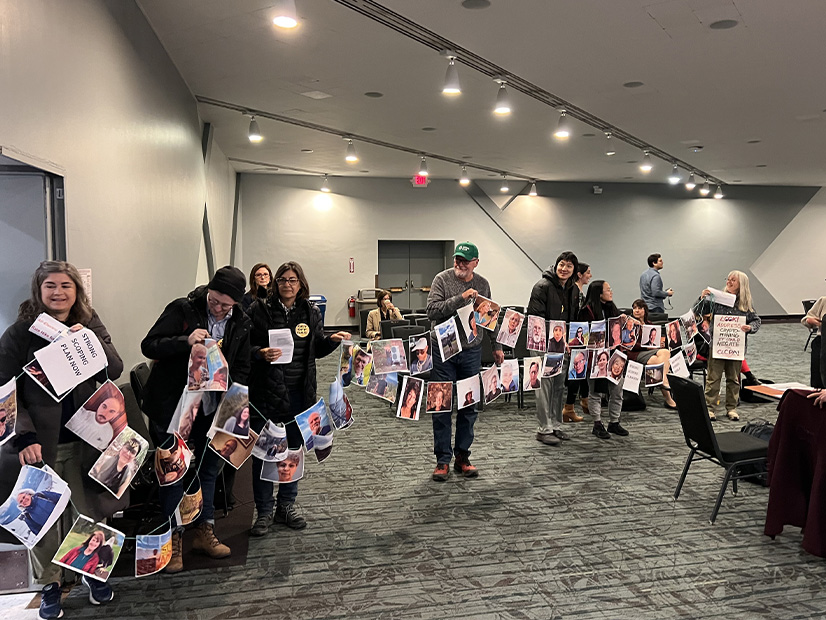ALBANY, N.Y. — New York Climate Action Council (CAC) members clashed last week over definitions of natural gas during discussions of potential edits to the Gas System Transition portion of its draft scoping plan.
Jessica Waldorf, director of policy implementation at the New York Department of Public Service, on Nov. 21 presented a summary of feedback given at earlier sessions, which included proposals to both change the term “fossil gas” to “natural gas” and to use the term “fossil natural gas” to differentiate from renewable natural gas (RNG) in the plan.
Waldorf explained that part of the thinking is that the distinction struck a middle ground between members who want the term “fossil natural gas” while addressing members’ concerns around public perception of the use of the term.
RNG refers to biogas produced by a variety of processes, such as anaerobic digestion or capturing agricultural waste emissions. Critics of labeling it “renewable” say it is misleading, as it is not produced naturally, and argue that “recycled” or “sustainable” would be better substitutes. According to EPA, “RNG is a ‘term of art,’ and there is not at present a standard definition.”
Some CAC members expressed opposition to the proposed revisions, however, based on the fact that RNG projects can still result in increased emissions.
Although he believed the proposal was a fine compromise, Bob Howarth, a professor at Cornell University, thought that too much weight was being given to RNG, which he said was an untested resource whose decarbonization role would likely be limited.
Raya Salter, executive director of the Energy Justice Law & Policy Center, expressed discomfort with the proposal, saying that the fossil fuel industry wants us to move forward with untested fuel models.
Meanwhile, supporters of the proposal argued that the distinction would enable flexibility within the scoping plan and that any debate was moot because these wider disagreements would not be resolved by the council.
Donna DeCarolis, president of the National Fuel Gas, stressed that it was important that the scoping plan include all available fuel options for the state to meet its energy goals.
Gavin Donohue, CEO of the Independent Power Producers of New York, agreed with DeCarolis’ assessment and added that he objected to the inclusion of the word “fossil” anywhere in the scoping plan because the word is not contained nor defined anywhere within the Climate Leadership and Community Protection Act.
Thomas Falcone, CEO of Long Island Power Authority, told the CAC that he supported the compromise, understanding both sides of the argument, but that it was more of a symbolic issue that, although important, would not be solved through the scoping plan.
Peter Costello, general counsel of the New York State Energy Research and Development Authority (NYSERDA), explained that the scoping plan is not a legally binding document, but, from a legal standpoint, these clarifications would help inform those who may be required to legally contextualize these terms in an effort to avoid any legal action.
Doreen Harris, CEO of NYSERDA, argued for the CAC to include a glossary at the end of the scoping plan that defines unresolved terminology or better contextualizes contentious topics. Paul Shepson, dean of the College of Marine and Atmospheric Sciences at Stony Brook University, agreed, saying readers could be confused.
 Climate protesters call for the end of gas usage in New York. | Allison Considine, Sierra Club
Climate protesters call for the end of gas usage in New York. | Allison Considine, Sierra Club
The debate around natural gas was fortuitous, as the start of the meeting was interrupted by protesters carrying a long string of photographs and signs calling for the end of gas usage across New York. Protesters told NetZero Insider that the photos were of individuals calling the governor’s office throughout the day to demand for the elimination of gas from the CAC’s final scoping plan.
“The actions we take today will have major implications for our future,” one protester said, adding that they were disheartened by the CAC’s debate around the “nomenclature” of gas.
Only two more CAC meetings remain, with Dec. 5 being the final day to resolve any outstanding items before the final vote on the scoping plan on Dec. 19.

